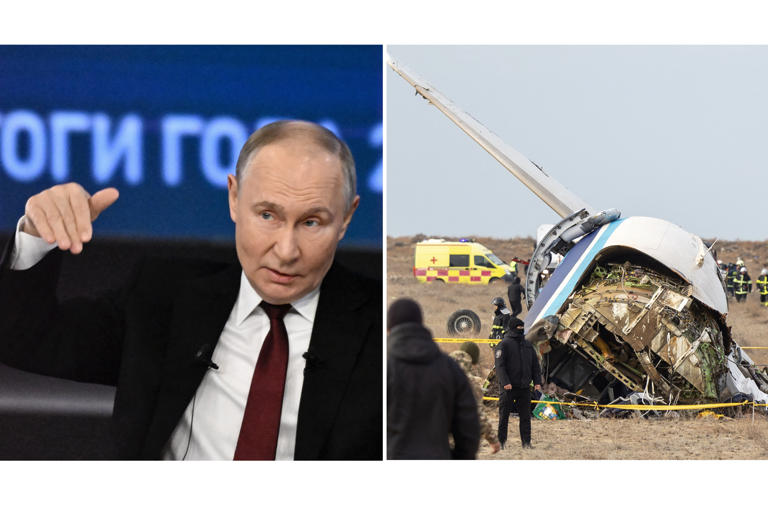The relationship between Russia and Azerbaijan has faced significant turbulence in recent months, culminating in an escalating diplomatic and political confrontation. At the heart of the current crisis is the December 2024 downing of an Azerbaijan Airlines (AZAL) passenger jet near Aktau, Kazakhstan, which resulted in 38 casualties. Azerbaijan has openly accused Russia of being responsible for the incident, alleging that Russian air defenses mistakenly targeted the aircraft. Although Russian President Vladimir Putin issued an apology, he stopped short of admitting responsibility, fueling further resentment in Baku. This incident has strained a historically complex relationship, pushing Azerbaijan to take retaliatory measures and shifting the geopolitical balance in the region.
The Plane Incident and Diplomatic Fallout
Azerbaijan has responded assertively to what it perceives as Russian aggression. President Ilham Aliyev has condemned Russia’s handling of the situation and has vowed to seek justice through international legal avenues. The Azerbaijani government has begun gathering evidence to present its case to international courts, further escalating tensions between the two countries.
Additionally, Azerbaijan has taken direct retaliatory steps, including the closure of the Russian House cultural center in Baku. The center, operated by Rossotrudnichestvo, a Russian federal agency responsible for soft power initiatives abroad, was accused of engaging in intelligence activities rather than promoting cultural ties. This move prompted outrage in Moscow, leading to a series of retaliatory threats from Russian officials and legislators.
Rising Hostilities and the Valuev Controversy
The closure of the Russian House sparked a harsh response from Russian lawmakers. Notably, Russian State Duma member Nikolai Valuev made inflammatory remarks suggesting that Russia should scrutinize the Azerbaijani diaspora within its borders. He implied that many Azerbaijani nationals in Russia were involved in illegal activities such as tax evasion and corporate raiding. Azerbaijan reacted swiftly, declaring Valuev persona non grata and banning him from entering the country. Azerbaijani media outlets have also intensified their criticism of Russia, recalling historical grievances, including the legacy of Soviet oppression and Russia’s role in past conflicts involving Azerbaijan.
Other Russian politicians echoed Valuev’s sentiment, warning of potential crackdowns on Azerbaijani businesses and migrants in Russia. This development has led to fears of economic and social repercussions for the large Azerbaijani diaspora in Russia, further fueling anti-Russian sentiments in Azerbaijan.
Broader Geopolitical Implications
Beyond the immediate diplomatic fallout, Azerbaijan’s response signals a significant shift in its geopolitical orientation. Baku has increasingly demonstrated a willingness to distance itself from Moscow and seek alternative alliances. In a notable move, Azerbaijan has provided aid to Ukraine, a gesture widely interpreted as a challenge to Russian influence in the region. This decision aligns Azerbaijan more closely with Western interests while aggravating tensions with Russia.
– Azerbaijan’s NATO Aspirations and Its Anti-Russian Stance
Azerbaijan’s recent moves suggest that it may be exploring closer ties with NATO as part of its strategy to counterbalance Russian influence. While Azerbaijan has not officially declared its intention to join NATO, its growing military cooperation with Turkey, a key NATO member, and its increasing alignment with Western security interests indicate a potential shift in that direction. By taking an assertive stance against Russia, Azerbaijan could be positioning itself as a strategic partner for the West, strengthening its security guarantees and economic prospects.
Turkey has been a strong advocate for Azerbaijan’s defense and sovereignty, particularly during the 2020 Nagorno-Karabakh war. A deeper military partnership between Azerbaijan and Turkey, coupled with increased collaboration with NATO states, could serve as a deterrent against future Russian aggression. However, this strategy aligns with a broader Western objective to weaken Russia’s influence in the region through Turkic world players like Turkey and Azerbaijan. By empowering these nations, the West aims to challenge Russia’s dominance in the South Caucasus and Central Asia, gradually diminishing its economic and military leverage.
– The West’s Strategy: Weakening Russia to Contain China
A weakened Russia ultimately translates into a weaker China, making it easier for the West to contain Beijing’s growing influence. Russia serves as a crucial geopolitical and economic partner for China, providing energy resources, military technology, and political support on the global stage. If Russia’s economic and military capacities are significantly diminished due to Western-backed challenges in the Caucasus and Central Asia, China could face greater obstacles in expanding its own regional and global influence.
By supporting Turkic world players like Turkey and Azerbaijan, the West is not only countering Russian influence but also indirectly weakening China’s strategic foothold. Russia’s instability could disrupt major infrastructure projects like the Belt and Road Initiative (BRI) and reduce China’s access to critical energy supplies. Additionally, Russia’s ability to act as a counterweight against Western dominance in international organizations would be undermined, further isolating Beijing on the global stage.
The Future of Russia-Azerbaijan Relations
The current strain in Russia-Azerbaijan relations marks one of the most significant diplomatic rifts between the two countries in recent history. While Russia has traditionally played a dominant role in the South Caucasus, Azerbaijan’s recent actions suggest an increasing willingness to assert its independence and challenge Moscow’s influence. The outcome of this confrontation will likely depend on how both sides navigate the legal and diplomatic ramifications of the plane incident, as well as their broader strategic interests.
As Azerbaijan moves closer to Western partners and strengthens its ties with other regional powers, Russia faces the challenge of maintaining its foothold in the region. Whether Moscow will seek reconciliation or further escalate its pressure on Azerbaijan remains to be seen. However, one thing is clear: the once-stable relationship between Russia and Azerbaijan has entered a new and uncertain phase, with lasting implications for regional security and geopolitical alignments.







